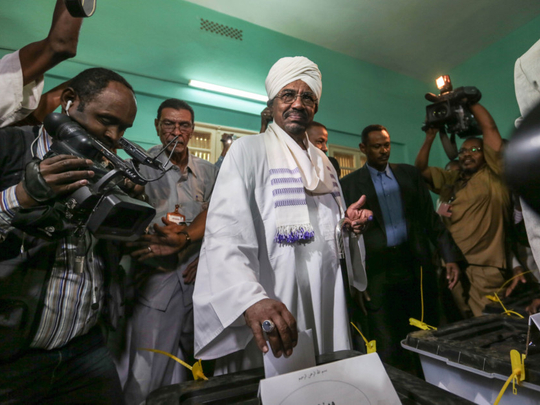
Khartoum: Sudanese President Omar Al Bashir was reelected on Monday with more than 94 per cent of the vote in polls in which he had faced no serious challenger, organisers said.
“The number of votes obtained by candidate Omar Hassan Ahmad Al Bashir of the National Congress Party was 5,252,478,” National Electoral Commission chief Mukhtar Al Asam told a Khartoum news conference.
The announcement was met with cries of “God is greatest” from some of the audience in the hall where the results were announced.
Al Bashir — wanted by the International Criminal Court on war crimes charges — had faced just 13 little-known challengers for the presidency, and the mainstream opposition boycotted the vote.
His closest competitor, Fadl Al Sayed Shuiab of the small Federal Truth Party, won “1.43 per cent,” Al Asam said.
After him came Fatima Abdul Mahmoud, of the Sudanese Socialist Democratic Union, who won 47,653 votes, around 0.85 per cent.
Polling stations had been quiet during the vote, despite a nationwide one-day extension, and the African Union’s Election Observer Mission said there had been a “generally low turnout of voters throughout”.
Al Asam said turnout was around 46 per cent across the four days of polling, in which representatives of the national and state parliaments were also chosen.
Al Bashir’s NCP also dominated the elections for the national parliament, taking 323 of the 426 seats, Al Asam added.
International criticism
The controversial vote has already faced international criticism, with the United States, Britain and Norway slamming Sudan last week for its “failure to create a free, fair and conducive elections environment”.
The European Union’s foreign policy chief Federica Mogherini had said even before polling stations opened on April 13 that the elections could not produce a “credible” result, in part because of the government’s failure to hold a national dialogue with the opposition.
But Al Bashir hit back, labelling the critics “colonialist parties” and saying they would have no effect on the electoral process.
Most opposition parties boycotted and urged voters to stay away, saying the conditions were not right for a free election.
But some 44 parties did take part, many of which are allied to the NCP.
Al Bashir seized power in an Islamist-backed coup in 1989, and is Sudan’s longest-serving leader.
The elections earlier this month were only the second contested ballots since Al Bashir took power.
Then previous elections in 2010 were also marred by an opposition boycott and criticism that the vote did not meet international standards.












